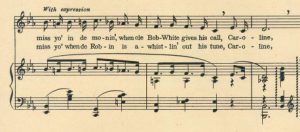Much like the tunes from our sheet music discussion, “Can’t Yo’ Heah Me Callin’ Caroline” features a sweet tune with racialized lyrics, leaving a bad taste in the mouth for most twenty-first century listeners who stumble upon it. (Side note: the plethora of sheet music that fit this exact description is somewhat overwhelming, to be honest.)
Composed in 1914 by Caro Roma, this song features the words of the poet William Henry Gardner — who she seemed to work with quite often, according to WorldCa. Like many popular minstrel songs and vaudeville pieces, W.H. Gardner writes in the dialect white people projected onto African Americans. Although the title is heavy with this racist misrepresentation, this poem also includes phrases like the following:
“I miss yo’ when de moonbeams out on de ribber shine,” and
“It’s mah heart a-callin’ dine.”
Likewise, the song follows the narrator who pines over his love Caroline, equating a lot of this emotion with natural imagery, as evidenced in the lines featured above. However, Caroline could be either oblivious to their attempts to swoon or is simply not interested. Regardless of what Caroline thinks of the narrator, I think this tune is not only relatable to most people, but speaks to a more common theme of unrequited love in art music — I digress, but Robert Schumann’s Dichterleibe comes to mind, especially considering the rich harmony combined with the expressive chromatic melody.
While I do enjoy the tune and the story, I chose this song because of a secondary video recording I discovered when searching for a recording of the piece. Listen to Bill Power’s rendition of “Can’t Yo’ Heah Me Callin’ Caroline” below.
To quote the only YouTube comment accompanying this video, I “don’t know [of] bill powers but this is mighty moving.” I shared a similar reaction to El Baby Snail after watching this video. Singer Bill Powers takes Roma’s prescriptive text “with expression” to heart. Each repetition of sweet Caroline’s name seems to stretch for longer and longer, articulated with a thoughtful breath or pause. Not only does the emotion of love and lack thereof come through in his voice, but his facial expressions and gestures take this performance to another level.
This performance actually reminds me of some of the interviews featured in Sheryl Kaskowitz’s article “Before It Goes Away….” In this blog post, Kaskowitz presents Rhiannon Giddens’s argument to understand the many layers that minstrel songs contain, including knowing a song’s history and even “replac[ing] offensive lyrics with those that uncover, rather than denigrate, the experience of African Americans.” In this recording, I see Bill Powers engaging with some of Giddens’s ideas, long before Giddens’s birth. The singer omits some of the lyrics– the line about the “ribber” and the entire second verse– and plays the written dialect way down. If anything, “heah” sounds reminiscent of a British accent in this recording.
Ultimately, I think this combination of sheet music and recording shows how the steps that African American performers took were incredibly small. Bill Power’s rendition of this tune produces a dignified version of a song that could have easily gone the other way. “[M]ighty moving,” indeed.
References
Kaskowitz, Sheryl. “Before it Goes Away: Performance and Reclamation of Songs from Blackface Minstrelsy,” The Avid Listener Blog. https://theavidlistenerblogcom.wordpress.com/2020/07/28/before-it-goes-away-performance-and-reclamation-of-songs-from-blackface-minstrelsy/
Merrill, Sally. “Roma, Caro.” Grove Music Online. 2 Jun. 2011; Accessed 28 Oct. 2021. https://www-oxfordmusiconline-com.ezproxy.stolaf.edu/grovemusic/view/10.1093/gmo/9781561592630.001.0001/omo-9781561592630-e-1002093474.
Reynolds, Christopher. “Documenting the Zenith of Women Song Composers: A Database of Songs Published in the United States and the British Commonwealth, Ca. 1890-1930.” Notes – Quarterly Journal of the Music Library Association 69, no. 4 (06, 2013): 671-687. https://www.proquest.com/scholarly-journals/documenting-zenith-women-song-composers-database/docview/1370890418/se-2?accountid=351.
Roma, Caro and Gardner, William Henry, “Can’t Yo’ Heah Me Callin’ Caroline” (1914). Historic Sheet Music Collection. 38. https://digitalcommons.conncoll.edu/sheetmusic/38

